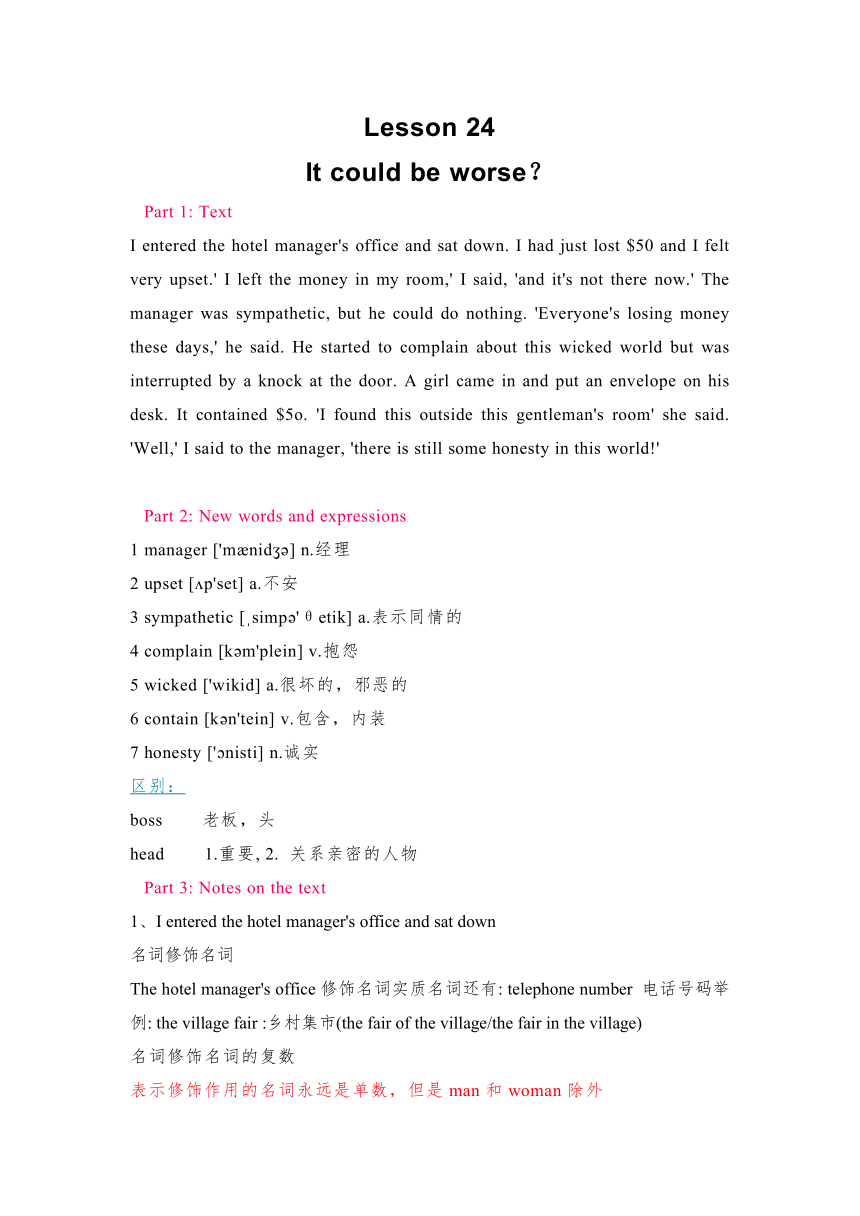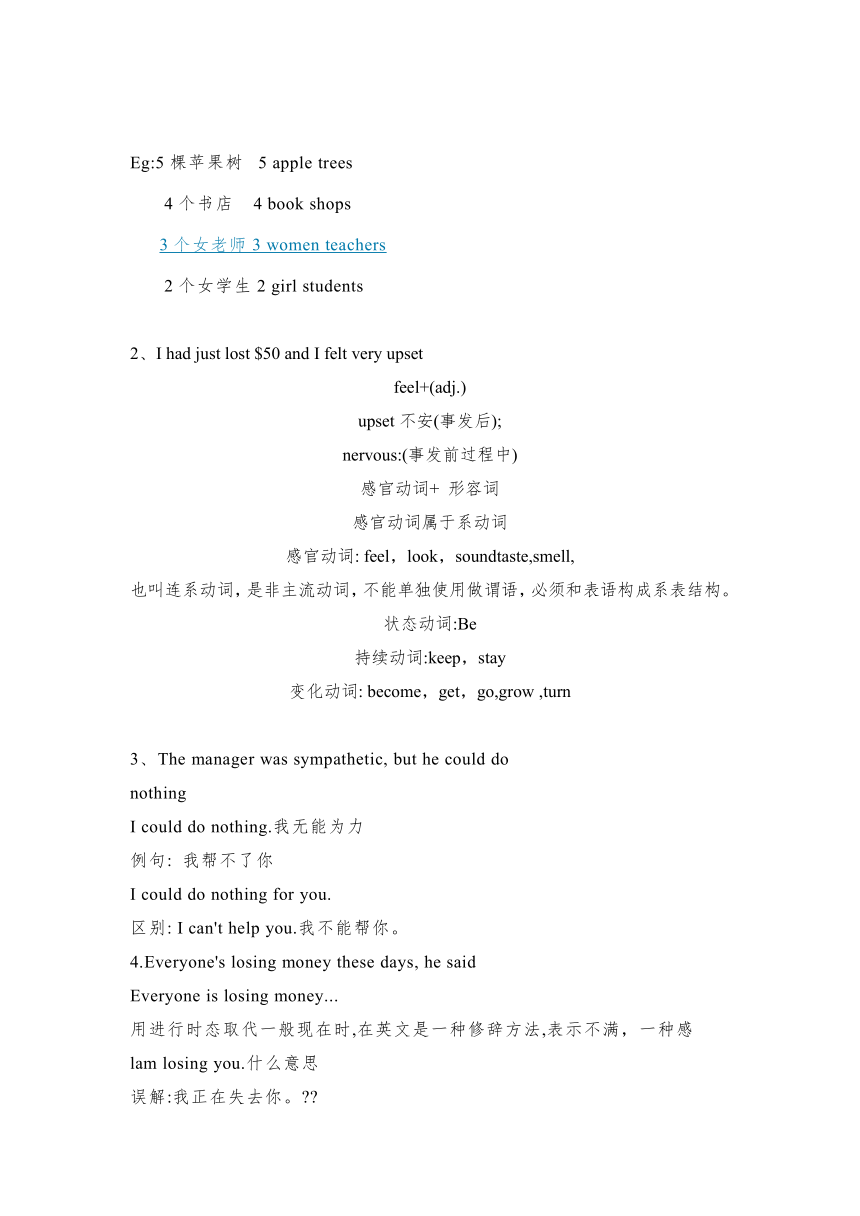新概念英语第二册 Lesson 24 It could be worse 讲义
文档属性
| 名称 | 新概念英语第二册 Lesson 24 It could be worse 讲义 |

|
|
| 格式 | docx | ||
| 文件大小 | 20.2KB | ||
| 资源类型 | 教案 | ||
| 版本资源 | 新概念英语 | ||
| 科目 | 英语 | ||
| 更新时间 | 2023-09-24 00:00:00 | ||
图片预览


文档简介
Lesson 24
It could be worse?
Part 1: Text
I entered the hotel manager's office and sat down. I had just lost $50 and I felt very upset.' I left the money in my room,' I said, 'and it's not there now.' The manager was sympathetic, but he could do nothing. 'Everyone's losing money these days,' he said. He started to complain about this wicked world but was interrupted by a knock at the door. A girl came in and put an envelope on his desk. It contained $5o. 'I found this outside this gentleman's room' she said. 'Well,' I said to the manager, 'there is still some honesty in this world!'
Part 2: New words and expressions
1 manager ['m nid ] n.经理
2 upset [ p'set] a.不安
3 sympathetic [ simp 'θetik] a.表示同情的
4 complain [k m'plein] v.抱怨
5 wicked ['wikid] a.很坏的,邪恶的
6 contain [k n'tein] v.包含,内装
7 honesty [' nisti] n.诚实
区别:
boss 老板,头
head 1.重要, 2. 关系亲密的人物
Part 3: Notes on the text
1、I entered the hotel manager's office and sat down
名词修饰名词
The hotel manager's office修饰名词实质名词还有: telephone number 电话号码举例: the village fair :乡村集市(the fair of the village/the fair in the village)
名词修饰名词的复数
表示修饰作用的名词永远是单数,但是man和woman除外
Eg:5棵苹果树 5 apple trees
4个书店 4 book shops
3个女老师 3 women teachers
2个女学生 2 girl students
2、I had just lost $50 and I felt very upset
feel+(adj.)
upset不安(事发后);
nervous:(事发前过程中)
感官动词+ 形容词
感官动词属于系动词
感官动词: feel,look,soundtaste,smell,
也叫连系动词,是非主流动词,不能单独使用做谓语,必须和表语构成系表结构。
状态动词:Be
持续动词:keep,stay
变化动词: become,get,go,grow ,turn
3、The manager was sympathetic, but he could do
nothing
I could do nothing.我无能为力
例句: 我帮不了你
I could do nothing for you.
区别: I can't help you.我不能帮你。
4.Everyone's losing money these days, he said
Everyone is losing money...
用进行时态取代一般现在时,在英文是一种修辞方法,表示不满,一种感
lam losing you.什么意思
误解:我正在失去你。
正解:我这里信号不好。
My sister is always helping the poor(赞扬Mary is constantly talking loudly in class.(讨厌)
现在进行时还可表示将来
Tom is leaving for Shanghai.5、He started to complain about this wicked world but wasinterrupted by a knock at the door.
start to do/start doing :开始做......
两者无区别
例句:他开始学习英语了
He started to learn English.
He started learning English.stop to do/ stop doing : 停止做……
两者有很大区别
eg:He stopped to learn English.
他停止所有的事儿开始学英语了。
=他开始学习英语了。
He stopped learning English.他停止学习英语了。
Part 4: Grammar&Difficult points
感叹句
感叹句的基本句型
【句型一】What+a/an+形容词+名词+主语+谓语!
在感叹句中,What a/an常用来修饰单数可数名词,若其前面的形容词为元音开头,则用an。修饰复数可数名词和不可数名词是不加a/an。但有些不可数名词,如rain,surprise,breakfast,lunch……当前面有形容词修饰,使抽象名词具体化时,则要加a/an。
What a clever boy he is!
他是个多么聪明的男孩啊!
What an interesting story it is!
这是个多么有趣的故事啊!
What fine weather it is!
多好的天气啊!
What beautiful flowers they are!
它们是多么漂亮的花啊!
What a heavy rain it is!
多大的一场雨啊!
What a rich breakfast it is!
多么丰盛的一顿早餐啊!
【句型二】How+形容词/副词+主语+谓语!
how句式可以改写绝大部分what句式,另外how句式还可以修饰动词构成感叹句,但动词不提前。
How well you look!
你气色真好!
How kind you are!
你心肠真好!
How beautifully you sing!
你唱得真好听!
Strawberries! How nice!
草莓!太棒了!
How clever the boy is!
这个男孩多么聪明啊!
How fast he runs!
他跑得多么快啊!
How I want to be a doctor!
我多么想成为一名医生啊!
How nice she dances!
她跳得多好啊!
Part 5: Homework
1.背诵lesson 24单词&课文
2.Retell the story
3.感叹句的表达
It could be worse?
Part 1: Text
I entered the hotel manager's office and sat down. I had just lost $50 and I felt very upset.' I left the money in my room,' I said, 'and it's not there now.' The manager was sympathetic, but he could do nothing. 'Everyone's losing money these days,' he said. He started to complain about this wicked world but was interrupted by a knock at the door. A girl came in and put an envelope on his desk. It contained $5o. 'I found this outside this gentleman's room' she said. 'Well,' I said to the manager, 'there is still some honesty in this world!'
Part 2: New words and expressions
1 manager ['m nid ] n.经理
2 upset [ p'set] a.不安
3 sympathetic [ simp 'θetik] a.表示同情的
4 complain [k m'plein] v.抱怨
5 wicked ['wikid] a.很坏的,邪恶的
6 contain [k n'tein] v.包含,内装
7 honesty [' nisti] n.诚实
区别:
boss 老板,头
head 1.重要, 2. 关系亲密的人物
Part 3: Notes on the text
1、I entered the hotel manager's office and sat down
名词修饰名词
The hotel manager's office修饰名词实质名词还有: telephone number 电话号码举例: the village fair :乡村集市(the fair of the village/the fair in the village)
名词修饰名词的复数
表示修饰作用的名词永远是单数,但是man和woman除外
Eg:5棵苹果树 5 apple trees
4个书店 4 book shops
3个女老师 3 women teachers
2个女学生 2 girl students
2、I had just lost $50 and I felt very upset
feel+(adj.)
upset不安(事发后);
nervous:(事发前过程中)
感官动词+ 形容词
感官动词属于系动词
感官动词: feel,look,soundtaste,smell,
也叫连系动词,是非主流动词,不能单独使用做谓语,必须和表语构成系表结构。
状态动词:Be
持续动词:keep,stay
变化动词: become,get,go,grow ,turn
3、The manager was sympathetic, but he could do
nothing
I could do nothing.我无能为力
例句: 我帮不了你
I could do nothing for you.
区别: I can't help you.我不能帮你。
4.Everyone's losing money these days, he said
Everyone is losing money...
用进行时态取代一般现在时,在英文是一种修辞方法,表示不满,一种感
lam losing you.什么意思
误解:我正在失去你。
正解:我这里信号不好。
My sister is always helping the poor(赞扬Mary is constantly talking loudly in class.(讨厌)
现在进行时还可表示将来
Tom is leaving for Shanghai.5、He started to complain about this wicked world but wasinterrupted by a knock at the door.
start to do/start doing :开始做......
两者无区别
例句:他开始学习英语了
He started to learn English.
He started learning English.stop to do/ stop doing : 停止做……
两者有很大区别
eg:He stopped to learn English.
他停止所有的事儿开始学英语了。
=他开始学习英语了。
He stopped learning English.他停止学习英语了。
Part 4: Grammar&Difficult points
感叹句
感叹句的基本句型
【句型一】What+a/an+形容词+名词+主语+谓语!
在感叹句中,What a/an常用来修饰单数可数名词,若其前面的形容词为元音开头,则用an。修饰复数可数名词和不可数名词是不加a/an。但有些不可数名词,如rain,surprise,breakfast,lunch……当前面有形容词修饰,使抽象名词具体化时,则要加a/an。
What a clever boy he is!
他是个多么聪明的男孩啊!
What an interesting story it is!
这是个多么有趣的故事啊!
What fine weather it is!
多好的天气啊!
What beautiful flowers they are!
它们是多么漂亮的花啊!
What a heavy rain it is!
多大的一场雨啊!
What a rich breakfast it is!
多么丰盛的一顿早餐啊!
【句型二】How+形容词/副词+主语+谓语!
how句式可以改写绝大部分what句式,另外how句式还可以修饰动词构成感叹句,但动词不提前。
How well you look!
你气色真好!
How kind you are!
你心肠真好!
How beautifully you sing!
你唱得真好听!
Strawberries! How nice!
草莓!太棒了!
How clever the boy is!
这个男孩多么聪明啊!
How fast he runs!
他跑得多么快啊!
How I want to be a doctor!
我多么想成为一名医生啊!
How nice she dances!
她跳得多好啊!
Part 5: Homework
1.背诵lesson 24单词&课文
2.Retell the story
3.感叹句的表达
同课章节目录
